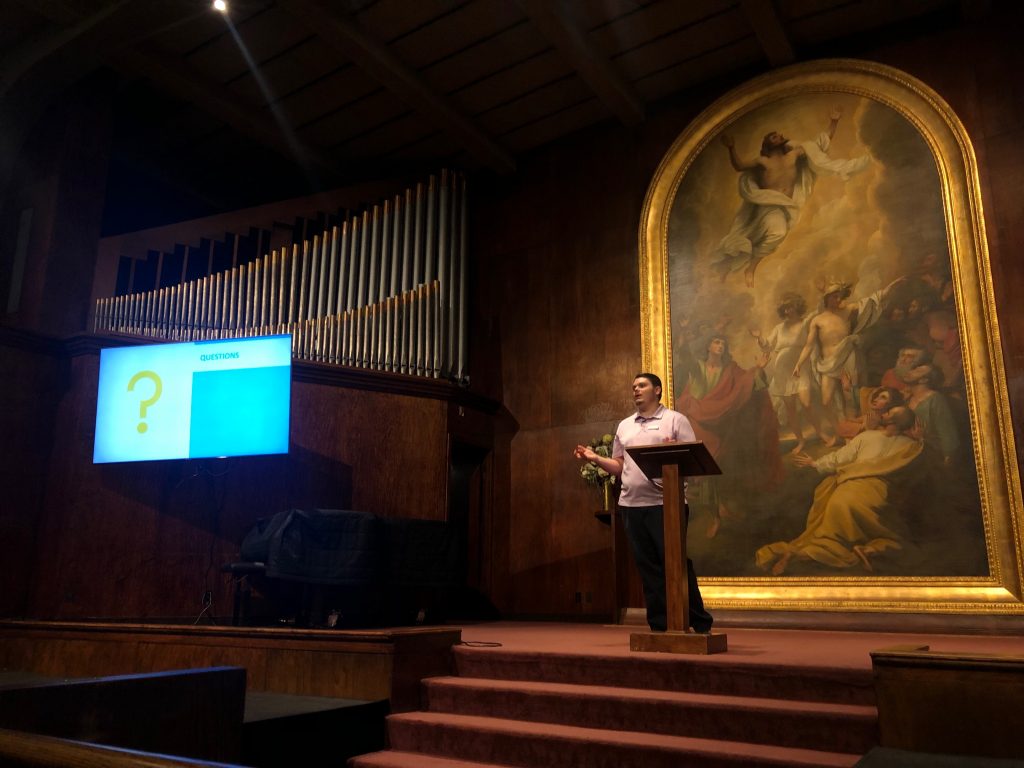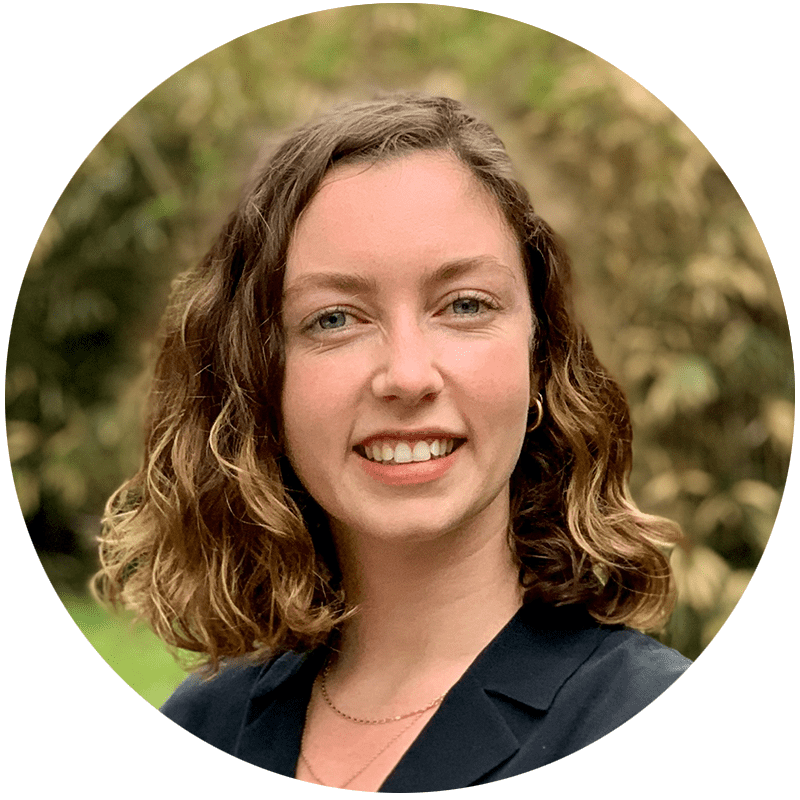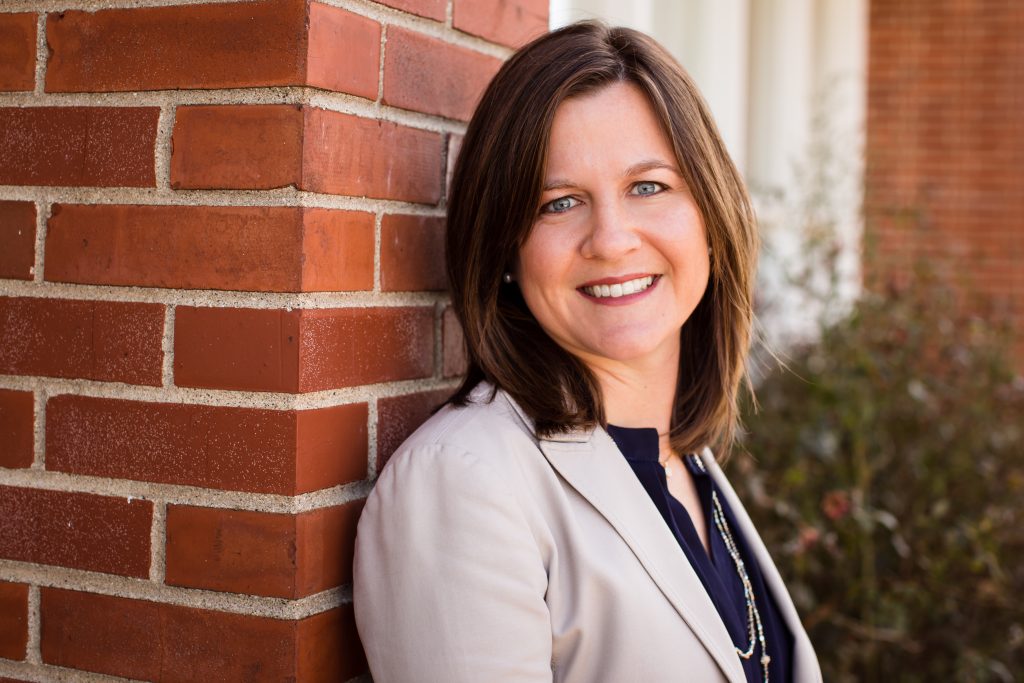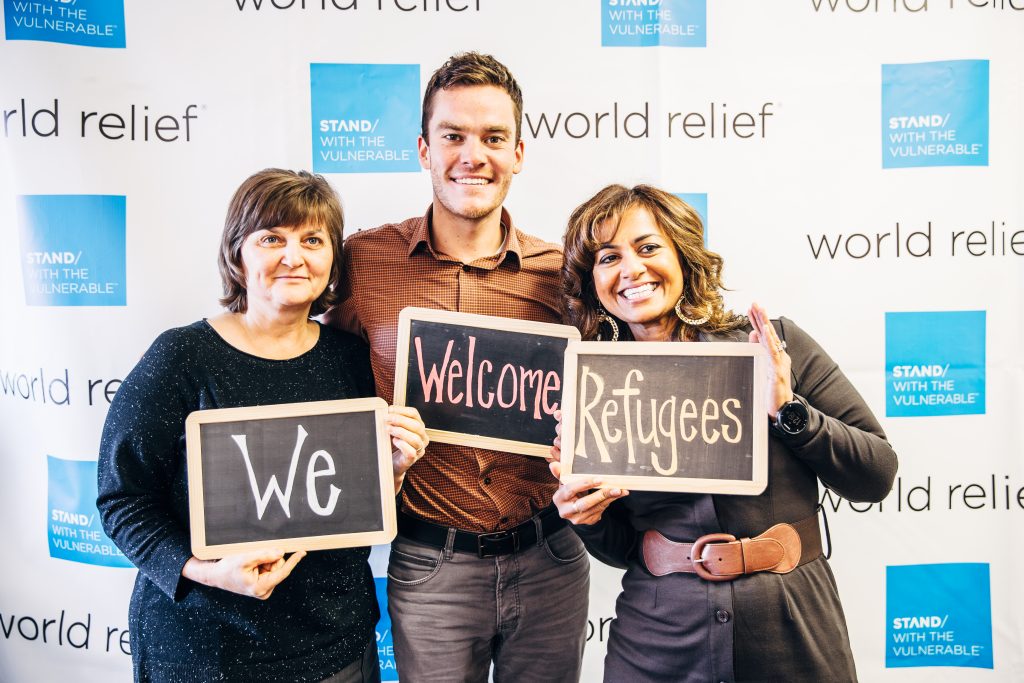Posts Tagged ‘Staff Reflection’
Women and Equity at World Relief
March 8th marks International Women’s Day, a day devoted to celebrating women’s achievements for a more diverse and inclusive world. At World Relief, we believe in equality and the importance of increasing awareness of women’s experiences, challenges and contributions in our communities every day. We are blessed to work and serve with many women from all walks of life.
Meet Lanre Williams-Ayedun, SVP of International Programs. She is one of the incredible women of World Relief whose unwavering dedication, passion and hard work serve as an inspiration to all of us!
Known amongst colleagues as a dynamic and passionate leader in the global development field, we were eager to sit down with Lanre to hear from her about how World Relief is embracing equity and equality in our workplace.
Thank you for talking with us today, Lanre! To start, can you share what brought you to World Relief, and what excites you most about your role?
It gives me great joy that I can say with confidence that the Lord brought me to World Relief and has been uniquely preparing me for this role throughout my life. I have worked in various aspects of international development for over 18 years and it has been both humbling and powerful to see my past experiences and skills come fully to bear in this position. More concretely, I am at World Relief because I have had a deep respect for the World Relief people I’ve known over the years.
I am fueled by World Relief’s vision to reach the most vulnerable by working with the local church in partnership with local communities. I get excited to see our teams serving God with diligence and excellence with their passions, talents and experiences to bring his kingdom near.
This year’s theme for International Women’s Day is “embracing equity.” How are you embracing equity in International Programs at World Relief?
First, as a leadership team, we have decided not to be afraid to examine where there might be inequities in our organization, whether they be related to nationality, culture, gender, disability, age or other differences. It is so important that we are mindful of healthy practices that not only encourage equity but that can actually be measured. For example, we are scoring each of our international offices against a gender scorecard and tracking results over the years.
Additionally, we are reviewing our staff engagement results on Diversity, Equity and Inclusion and creating an associated action plan. Training around gender equity and disability inclusion for staff and with program participants across International Programs is also underway.
Along with consistently celebrating women and men leading together, we are also embracing a spiritual and holistic approach by participating in devotions on racism and cultural diversity as a team.
Why is fostering an inclusive work environment so important?
Right now, World Relief’s International Programs is a team of great diversity: Our staff consists of people from at least 20 different nationalities, with many ethnic and tribal differences. We are based in 11 countries, from various church traditions, and covering various age and generational groupings. 29% of our staff are female, and there is a 50/50 split of men and women on our expanded leadership team. And our work is to serve people that are themselves very diverse and have unique needs and preferences.
All of this diversity can mean that learning to recognize and honor each other for our differences and to make room for each other does not come naturally. Yet, we have to grow in our ability to work for and serve with people that are different from us; it’s our mandate from God and a testimony to the watching world.
God has called us to be different parts of the same body, and to cherish and help each part fulfill its purpose. When we seek to make offices and a work culture that allow people to bring their gender and culture to share, the employee is happier and more engaged, and the collective staff is made stronger and reflects God’s vision of Christian unity better.
How do you think World Relief and other organizations like it can embrace equity and equality?
A good start is to intentionally ensure having diverse representation at the highest levels of power — on boards and senior leadership teams — including diversity of gender, race, age, disability and culture. It’s also important to have that representation throughout the organization by making HR practices and policies equitable, and having a feedback mechanism that allows the organization to address when there are violations that hurt people and abuse authority.
Also, we should make resources available to create equitable access to opportunities for all staff while decolonizing our language, service models and structures of authority. And by recruiting and supporting diverse staff to thrive by fostering a culture of belonging and providing generous family leave, health insurance and child care coverage is essential. The work can be challenging but we must also be sure to acknowledge and fight against the systemic forces within the organization and industry that perpetuate inequities among and between staff and the people we serve.
That is so insightful. Last question — what are your long-term aspirations for International Programs at World Relief?
I want to see World Relief’s International Programs be a place where diverse people can be successful and bring their whole self to work in a culture that celebrates their individuality and promotes their well being. I want us to take the work of equity and equality seriously for our staff and for the people we serve — using our prophetic voice to call focus to the issues affecting the most vulnerable.
Thank you for sharing with us Lanre! If you want to hear more stories of how the women of World Relief are creating change around the globe, follow us on Facebook, Instagram or LinkedIn.

Jessica Galván is a Content Writer at World Relief. She is passionate about storytelling and amplifying diverse voices to reveal the beauty of God’s creation. She is also the Editorial Director for Chasing Justice and prior to World Relief, she was a freelance writer and editor for a variety of clients in publishing, most recently Penguin Random House. When she isn’t wordsmithing for the pursuit of faith and justice, she is spending time with her husband and their 3 children in the Houston, TX area.
Breaking Down Barriers: How Autism Has Helped Me Serve My Refugee Neighbors
I’ve lived in the same place my whole life. I have never had to leave everything I know out of fear for my life. In many ways, my life and the lives of my refugee and immigrant neighbors couldn’t be more different.
Yet, I do know what it feels like to be on the outside looking in. For as long as I can remember, I have felt somewhat out of place, like I wasn’t meant for this world in some way. I didn’t know the reason for this — it was just the way I was.
It wasn’t until I was 20 years old that I finally realized why I felt so out of place. That’s when I first heard, “You have autism.”
On one hand, I was relieved. I finally had an answer for why I felt like a person who was told to play the game without being given the rules. On the other hand, it expanded my understanding of just how much our society is not built to accommodate people like me.
Fighting the battles that come along with having autism has been difficult, but it’s also afforded me a unique love for learning from those whom society often relegates to the margins. Over the years, this has meant seeking to be mentored by African American pastors, working with the imprisoned and searching out opportunities to see how my Christian faith intersects with building up my local community.
In college, I was introduced to this type of ministry when I had the opportunity to work with refugees as an ESL tutor. For me, this felt like a natural extension of my passion for reflecting God’s love to those on the margins. Years later, through God’s providence, I was given the opportunity to continue serving refugees when I joined the World Relief Upstate SC team right here in my own community in South Carolina.
Now, in my role as the Upstate SC Mobilization and Development Coordinator (and formerly as the Church and Volunteer Engagement Coordinator), my life is full of paradoxes. I am a person who struggles with social interactions, but I must frequently speak to volunteers, churches and other community partners about how we are called to love and serve refugees. Accepting unpredictability and ambiguity does not come naturally to me, yet refugee resettlement is anything but predictable.

While these are paradoxes, they show that God uses every single person to advance his cause and that his kingdom breaks down barriers of gender, race, ethnicity and even disability. In fact, because of my disability, I believe it can sometimes be easier for me to put myself in the shoes of refugees and immigrants who are feeling out of place and lost in a culture and society that wasn’t built for them.
For many refugees and immigrants, navigating new communities, grocery stores, school systems, workplaces and more can feel like trying to put a puzzle together without knowing what the finished product should look like. That’s a feeling I can certainly relate to.
My experience with autism spectrum disorder also gives me compassion for the fear and uncertainty that many of our refugee and immigrant neighbors face in their daily lives. I understand what it means to cling to Matthew 6:34, which says “do not worry about tomorrow, because tomorrow will worry about itself.”
While I do not discount the many challenges people like me face or the differences between my experience and that of refugees, I do believe wholeheartedly that the good news of God transforms even the most difficult of situations for our good and his glory.
At World Relief, I’ve found a place where I can work within my strengths and limitations as someone who has autism and experience God’s transformation in my life and in the lives of those around me.
World Relief is committed to building welcoming communities that value and accept refugees and immigrants. That same culture has helped me feel valued and accepted. Our Office Director, Brandon Baughn, has been an especially faithful example of this culture of welcome, giving me the blessing of trust in my work and in my perspective not only as someone with autism, but more importantly, as a follower of Christ who is passionate about serving “the least of these.”
This trust has allowed me to run headlong into serving churches and volunteers so that they, too, can create communities of welcome. I am able to do my work knowing that World Relief welcomes my unique perspective and does not see my disability as a hindrance.
Together, we are moving towards creating spaces where people of all nations, backgrounds and abilities can embrace their God-given purpose and live out their full potential.
At World Relief, we are grateful for faithful staff like Austin. We rely on the time, talents and treasure of people like you to continue moving forward together. You can join us by giving today or by checking out our careers page to see if working at World Relief is a good fit for you.

Austin Donahoo is the Mobilization Development Coordinator at World Relief Upstate SC, where he previously served as the Church and Volunteer Engagement Coordinator. He loves integrating his passions for Christian ministry and theology with community engagement, believing that the call of the gospel is to be shown in both word and deed. At World Relief, he works to do this by equipping churches and volunteers to love their refugee and immigrant neighbors.
Liberty and Justice for All: A Citizenship Story
On September 17, U.S. Citizenship and Immigration Services invites “Americans to reflect on the rights and responsibilities of citizenship and what it means to be a U.S. citizen” as part of an annual Citizenship Day observance. This year, we’re celebrating citizenship and the stability it can bring to those who have been displaced by sharing Aimee’s story.
For the first 24 years of her life, Aimee had no citizenship at all. Born as a refugee in the Republic of Congo and resettled in the U.S. at the age of 15, living without citizenship felt like a continual search for permanence — until July 2, 2022 when she became a naturalized U.S. citizen. Finally, Aimee has a country to call her own!
On the World Relief Western Washington blog, Aimee shares what citizenship means to her and how she plans to use her new nationality to continue serving displaced people around the world.
Do you want to help more people like Aimee Pave the Path to a brighter, more secure future? Whether helping displaced people rebuild their lives, building peace in divided communities or finding sustainable solutions for families impacted by climate change, you can be a part of creating lasting change around the world when you join The Path, our community of monthly givers.
From Welcomed to Welcomer
At the end of April, World Relief will celebrate National Volunteer Appreciation Week, a time to recognize the impact and power of volunteers to “tackle society’s greatest challenges, build stronger communities and be a force that transforms the world.”
Last year, World Relief engaged 8,430 volunteers and 873 church partners in the U.S. to welcome and walk alongside their refugee and immigrant neighbors. Today, Todun Afolabi, World Relief’s U.S. Volunteer Engagement Manager, shares her own journey from welcomed to welcomer.
The Ministry of Welcoming
When I think about God’s heart for welcoming strangers, I think of Ruth and Naomi’s story in the Bible.
Naomi was the mother of Mahlon, Ruth’s first husband. Naomi’s family had traveled to Moab because of famine in Judah. While displaced from their homeland, Mahlon met and married Ruth, a Moabite. But when Mahlon and his father died, Ruth and Naomi returned to Judah as widows.
Naomi knew what it was like to be a stranger in a foreign land, and she was instrumental in helping Ruth resettle in Judah. She showed her how to secure food and, eventually, even connected her with her future husband, Boaz. Through Naomi’s care and advice, Ruth was able to establish a new home.
Needing a Naomi
For me, welcoming newcomers is ministry — and it’s personal.
When I was a stranger in a foreign land, there were many “Naomis” who spoke into my life and helped me adjust to my new home. I’ve learned that you can’t downplay the role of God in your life, especially in how he connects people and brings them together.
In 2011, my husband and I came to the U.S. from Nigeria as newlywed graduate students. As a couple, we couldn’t stay on campus, so we found a small apartment. At the time, we didn’t have enough money for furniture. We were just glad to have a roof over our heads.
We soon started attending a local church, and one of the pastors asked how we were adjusting and if we needed anything. I was hesitant to acknowledge how little we had and how far from home we felt, but we couldn’t hide our needs.
Later that week, I was amazed when the pastor called and asked if we were home. Within minutes, this truck drove up with chairs, a table, a dining room set — everything needed to make the apartment into a home for us.
That was the first of many ways the church surrounded us and helped us through our early years in the U.S. — and as a married couple! Our first car was donated to us by the church. They helped us cover rent expenses when money got a little too tight. When I got pregnant with our first child, they bought maternity and baby clothes and celebrated with us when our son was born.
I think God allowed me to experience the church’s welcome first-hand so I could understand how important it is. They showed us the heart of Christ. Now in my position at World Relief, that same heart motivates me to help others welcome newcomers the way I was welcomed.
Becoming a Naomi
When I joined World Relief as the Chicagoland Church and Volunteer Coordinator in Dupage-Aurora in 2018, it was an opportunity to become a Naomi for others.
I remember meeting a young woman who had recently arrived in the U.S. from Rwanda, and I was telling her my story — how I came and what had happened in my life since. She told me, “If you can do it, then I can,” and I said, “Yes! It’s possible. It’s really possible!”
It’s powerful to see that lightbulb go off, to see the encouragement and the hope that comes when someone realizes that they can do this — and that they don’t have to do it alone. That’s why I’m so passionate about helping the welcomers know and express the heart of God for strangers.
I wanted to keep bridging the gap between churches, volunteers and newcomers not just in Chicagoland, but across the country. In 2021, I transitioned to a role with World Relief’s Home Office as the U.S. Mobilization Specialist and now, I’m the U.S. Volunteer Engagement Manager.
In each of these roles, I’ve seen the mutual transformation that happens when churches and volunteers work together with their newcomer neighbors to welcome them — just like I was welcomed.
Welcome is for Everyone
At World Relief, we want to make room for everyone to be a part of welcoming newcomers, and I’m especially excited to invite those who have immigrant stories like me to volunteer with us. We can play an important role in being Naomis to our new neighbors, helping them adjust and adapt, just like we did.
It was a Naomi in my life who introduced me to volunteering. I started helping at a local food pantry and discovered that it was a good way to give back, but also an opportunity for me to build relationships and integrate. I realized it was a way for me, as an immigrant, to say, “This is my community now, too.”
I’ve learned that — whether you’re an immigrant, refugee, asylum seeker, a church partner or anyone else in the community — you have something to give. Even if it’s an hour a week or giving someone a ride to an appointment, those things really have an impact. I know because they had an impact on me!
Volunteering is where we get to bridge the gap between the heart of Christ and the needs of our community.
I look at my experience and see God’s hand in all of it — in the way I was welcomed and the way I now get to help others welcome. I’m grateful for this ministry God has given us at World Relief, and I’m grateful to have churches, volunteers, neighbors and people like you ministering together with me.
Do you want to create lasting change alongside passionate, mission-driven coworkers like Todun? World Relief is growing our team to meet the increased needs of our world, and we’re looking for people like you to join us.

Todun Afolabi joined World Relief in 2018 and currently serves as the US Volunteer Engagement Manager. With a background in law, she is passionate about humanitarian efforts and engaging communities in their stories of change.
7 Ways to Love Your Neighbor
In Rwanda we have a saying — “Ifuni ibagara ubucuti ni akarenge.” This literally means, “a hoe that cultivates friendship is a foot.” In other words, we love our neighbor by visiting them and helping if they need anything.
No matter where you live, loving your neighbor is an integral part of our call as Christians. Having served alongside local churches in Memphis and Rwanda, we have seen first-hand how loving your neighbor comes in all shapes and sizes.
In some places, loving your neighbor might mean sharing baked goods. In another, it may mean dropping by unannounced for an afternoon tea. And still, for others it could mean fetching water or making bricks for a neighbor who is building a house. Yet, no matter where you live, one thing remains the same: We love because God first loved us. That’s why today, we’re sharing 7 Ways to Love Your Neighbor.
1. Take the Initiative and Value Small Acts of Kindness
Helping one another without being asked to do so is part of the culture in Rwanda. And doing something for your neighbor does not always require much. If your neighbor is sick, you could visit them, deliver groceries to them or take them to the doctor when necessary.
In rural Africa, if a neighbor is building a house, you could lend a hand by fetching water for them, making bricks or finding wood. In short, loving your neighbor is in action more than words.
2. Spend time
Quality time is said to be one of the five major ways people experience love. That’s true no matter who you are or where you’re from. When refugee families first arrive in the U.S., many often feel isolated with no family, no community and no means of transportation. Even if there is a language barrier, the simple act of spending time with our neighbors can make a world of difference. Whether you pop in for a tea or a walk, just knowing that someone cares and that they are not alone allows refugee families to feel the love of Christ through our actions.
3. Share a meal
Sharing a meal is perhaps one of the best ways to show our love for our neighbors. Whether it’s at your home or theirs, breaking bread together meets not only a physical need but also the mental and spiritual need for relationship.
No matter where you live, meals are an opportunity to connect, sharing our own culture while experiencing someone else’s. Especially for many refugees rebuilding their lives in the U.S., sharing a meal also demonstrates respect and interest in their life and culture, something that may often be overlooked in their new home.
4. Foster Reconciliation
Loving your neighbor can encompass more than lending a hand. It’s also reconciling relationships. In some Rwandan communities, church members often disregarded people from other denominations, sometimes to the point of viewing them as non-believers and refusing to work together.
After being trained by World Relief, church leaders, volunteers and program participants are reaching across denominational lines to adopt a culture of loving their neighbor by acting together. They’ve realized that together, as a unified body, they can accomplish much more, and they’re seeing ripple effects of love, joy, peace and harmony across whole communities.
Ask yourself — is there someone I can love by moving toward reconciliation and forgiveness? Is there someone I disagree with politically or denominationally that I can build a connection and a friendship with?
5. Listen
Paying close attention and listening to what your neighbors are saying is so important. We may have had very different upbringings and viewpoints, but we are all made in the image of God, and each of us has a story to tell. By listening to that story, we’ll learn new ways in which we can be intentional with our neighbors, showing them that they are welcomed and loved.
6. Advocate
While loving our neighbors on an interpersonal level is who we are called by Christ to be, sometimes systemic injustice is at the root of a problem, and loving our neighbor means advocating with them as well.
Advocacy is speaking up with those who are vulnerable to address the underlying causes of injustice by influencing the policies and practices of people in power. By starting with the reality of “what is,” we can leverage our voices to make systemic changes that lead to a vision of “what should be.”
7. Go Together
At World Relief, we believe we can accomplish so much more when we go together. In the U.S., our church partners form Good Neighbor Teams who work together to welcome and serve their new immigrant neighbors by taking them to appointments, picking up groceries or fostering friendships over lunch or dinner.
In places like Rwanda and Haiti, Outreach Group volunteers pair up to visit the homes of struggling families. Outreach Groups give local churches the opportunity to intentionally engage the community in a consistent way at a wide scale. Ordinary church members are equipped to do what Jesus taught and did — reaching out to their neighbors to share messages that lead to holistic development and facilitate relationships.
If you’re considering reaching out to a neighbor or participating in a service project, why not ask someone to join you, so this movement of love can grow further?
Living justly and loving our neighbor is better when we do it together. Share this article with a friend and invite them to join you in loving your neighbors this week.

Bailey Clark serves as the Communications Coordinator for World Relief Memphis. With a background in journalism and advertising, she is passionate about storytelling and its power to make a difference.

A pioneer in the documentation space, Emily Kankindi is the communications and documentation unit coordinator at World Relief in Rwanda. She started with World Relief in 2005 and has been growing through different stages while pursuing a career in creative communications with a passion to tell the story of impact. Driven by a mission to serve the most vulnerable, Emily is best known for inspiring others to care and serve the needy by using all possible means of communication to promote and call forth positive ramifications of WR interventions in all aspects of life. Her educational background is marketing and travel operations.
Reflections on 2021 from Executive Director Susan Sperry

The following letter is from Susan Sperry, World Relief Chicagoland’s Executive Director, who oversees World Relief’s work across three offices in Aurora, Chicago (Albany Park), and DuPage County (Carol Stream) and shared her leadership reflections at the close of 2021. Read more of Susan’s thoughts by following her on Twitter!
To all of World Relief Chicagoland’s generous supporters, partners, volunteers, and advocates,
As I reflect on 2021, I want to share my heartfelt thanks for each of you. I am continuously inspired and amazed by how you, a community of faithful volunteers, partners, supporters, and advocates, show up to love our immigrant and refugee neighbors well. You give your time, talent, material resources, and of yourselves.
Our Shared Calling
In Matthew 25, Jesus directly links himself with people in vulnerable situations. He tells the disciples that when they welcome the stranger, they welcome Him. For those of us who follow Jesus, this call is for us to recognize the image of God in all people. It asks us to see that when we welcome refugees and other immigrants in tangible ways, we welcome Jesus.
For I was hungry and you gave me food, I was thirsty and you gave me drink, I was a stranger and you welcomed me.
Matthew 25:35 (ESV)
You Answered the Call in 2021
In 2021, we saw you answer this call again and again.
- You helped World Relief Chicagoland welcome more new arrivals than in the previous two years combined. Together, we began new relationships that will continue as we walk with families for years to come.
- You mobilized family members, churches, and workplaces to generously share the essentials that newly-arrived refugee families need when they start to rebuild their lives.
- You volunteered – showing up on Zoom calls, in church gymnasiums, at apartment complexes, and to airport pickups. And by showing up, you offered friendship to our new neighbors and contributed to creating a community of welcome.
This year, the Abadi* family arrived in the U.S. unsure of how they would be received. They knew that in many ways, their home country, religion, and ethnicity would set them apart from their new neighbors. And yet you showed up to welcome them. You provided furniture, household essentials, and helped set up their new apartment. When the Abadis went to take a tour of the school their children would attend, students walked up to greet their new classmates. The teachers welcomed them warmly.
These small actions of students and teachers walking alongside the Abadi family reflected the power of community and of coming together to welcome and help one another.
Though rebuilding a life in a new country is never easy, the Abadis marveled, “We never expected a welcome like this.”
Thank You
In these and so many other ways, we saw you give generously. You brought your creative ideas to the table. You committed to welcoming immigrants and refugees in Chicagoland and beyond.
I am humbled by the ways that you have joined World Relief Chicagoland to serve families in vulnerable situations. And I am abundantly grateful to partner together with you in this work. Thank you. As we move forward together into 2022, I pray that we continue stepping into many opportunities to love and serve our neighbors. And that we can receive and reflect God’s love in vitally important ways.
Along with the entire staff of World Relief Chicagoland, I wish you and your loved ones a peace-filled season and new year.
Susan Sperry, Executive Director of World Relief Chicagoland
*The name of the family in this story was changed to protect their privacy.
Why World Relief Chicagoland Staff Are Thankful This Year
As we approach the end of the year and the start of the holiday season, many of us take time to reflect on the year behind us. We consider what we have to be thankful for. For some, the previous year was difficult, full of hard things and grief. That might make this holiday season feel painful or bittersweet. For others, this year has seen immense change or big life milestones.
Yes, practicing gratitude in the face of suffering and change is difficult. And yet, reflecting on what we have to be grateful for can help us be more hopeful as we seek joy and practice thankfulness.
At World Relief Chicagoland, we have seen God’s faithfulness in countless ways. Even amid big challenges and sad events, there is much to be grateful for. Because of that, we asked staff to share what they are thankful for this year. And the responses were inspiring! Join us in practicing gratitude today and read our staff’s testimonies below.
We believe that there are so many reasons to give thanks! Join us in counting your blessings. As a result, you might even see God’s grace and goodness in your life in new ways.
What are you thankful for this year?
I am grateful for trusting relationships with the people we serve and the chance to speak Swahili with some of them. I am also thankful to have friends among my coworkers and for the vibrant neighborhood and friends in Albany Park where our Chicago office is located, an office cube to make into a hospitable space, and the opportunity to worship each morning at our 8:30 prayer time.
– Katelyn Skye Bennett, Employment Counselor
I am grateful to work on a team that is passionate about serving refugees and other immigrants in learning English so that the students can fully integrate into the community and workplace.
– Mary Cerutti, Education Director, Suburbs
This year, I am grateful for the opportunity to be part of the World Relief family. I have felt welcomed and challenged to grow in my walk with God during morning prayer and words of encouragement from coworkers. I am so thankful to form part of a Christ-centered organization that supports and empowers the immigrant and refugee community through a holistic and sustainable approach while exemplifying the love of Christ.
– Brenda De Leon, Immigration Legal Services Paralegal
Welcoming our new neighbors…

Reflecting on 2021, I’m thankful that so many churches and volunteers are standing with us as we welcome arriving families and build community with immigrants and refugees who are already living in our neighborhoods and communities.
– Sara Aardema, Church and Volunteer Engagement Director, Chicago
One thing that I am grateful for is to work in an office when I can freely mention Jesus and prayer. I am also thankful that every day, I get to go to work and make a difference in someone’s life. Being the hands and feet of Jesus is priceless.
– Isoken Aiwerioba, Office Manager
I am grateful for the partnership with churches across Chicagoland, which are contributing to the reach of our God-given work in building and creating communities of love and welcome! Thank you, churches, for being the hands and feet of Jesus to strangers!
– Adrian Hendarta, Church Mobilization Coordinator
Making an impact, together…
Reflecting on 2021, I am grateful to work in a place where people make a difference and impact other people’s lives in the community and all around the world. World Relief has been an answered prayer in my life, and in many people’s lives. It is a blessing to be part of this work.
– Andrea Rodriguez, Immigration Legal Services Administrative Assistant
I am grateful for the foundation partners who believe in creating a brighter future and investing in their communities. That vision inspires me and reminds me that by working together, we really can create just and welcoming communities where everyone thrives.
– Carrie Woodward, Foundations Partnerships Manager
This year, I am so grateful for the incredible outpouring of love from our church partners. I am thankful for their strong interest in volunteering, generous giving, and inspiring their members to engage.
– Keith Draper, Church and Volunteer Engagement Director, DuPage & Aurora
What are YOU grateful for?
Thank you for reading what World Relief Chicagoland staff are grateful for! Now, spend some time thinking about the blessings in your life and work. What are those things that you are thankful for?
Finally, share your reflections with us! We want to hear from you! Please share what you are grateful for by tagging @WorldReliefChicagoland on Facebook or @WRChicagoland on Instagram or Twitter.
Loving Your Neighbor is a Key Part of Being a Good Citizen
On September 17th, U.S. Citizenship and Immigration Services invites “Americans to reflect on the rights and responsibilities of citizenship and what it means to be a U.S. citizen.”
Today, on Citizenship Day, World Relief’s Karen Spencer, who recently became a U.S. citizen herself, reflects on what her journey to citizenship has taught her about loving our neighbors and being a good citizen.
My Story
Growing up in a small city in central Canada, I was surrounded by immigrant families who openly shared stories of endurance and escape, now embraced by a new country to call home. These families immigrated from places like Ukraine, Hungary, Poland, Chile and Vietnam.
Most of my classmates were first or second-generation Canadians whose parents or grandparents warmly welcomed me into their homes, sharing interesting foods before sending me off with well-wishes in varying languages or accents.
As a second-generation Canadian myself, I clung to the tidbits of my Scottish, French and British family histories that I caught from conversations and scrapbooks. The movement of people fascinated me, so it wasn’t a surprise that I looked beyond my own country as a young adult to study in the United States. What I did not expect, however, was to fall in love with an American, marry and become an immigrant myself!
Becoming a Citizen
A few years ago, I worked with a World Relief Immigration Legal Specialist to pursue naturalization. Throughout the process, I was impressed by the expectation for me to have already displayed certain characteristics of citizenship: good moral character, adhering to the law and demonstrated service in my community.
But what intrigued me, however, was how community awareness and action were also strongly emphasized as required responsibilities for me and my fellow new citizens.
Beyond the application process itself, the naturalization ceremony emphasized giving back to our new country through acts of service. Various organizations had set up booths in a type of information fair to help us immediately find ways to serve the community. The definition of citizenship as the qualities that a person is expected to have as a responsible member of a community, was on full display.
This experience left me to wonder, do most other Americans realize this moral obligation as citizens? Or do many consider this responsibility to only apply collectively rather than personally?
Moreover, my faith compelled me to think even deeper — could it be that God’s call for me to love my neighbor is a key part of being a good citizen?
An Unsettling Reality
Lately, I have felt unsettled as I’ve watched the news and considered all the events that have forcibly displaced so many women, men and children from their homes: fires, floods, hurricanes, famine, political uprisings, war.
More than 82 million people currently live their lives displaced from their homes — some have been temporarily internally displaced, like those in Louisiana affected by Hurricane Ida’s devastating floods, or those in Haiti affected by the recent earthquake that happened in August.
Others have been evacuated from their countries on military planes as we witnessed in Afghanistan. Even more walk or run to the borders of neighboring countries for shelter in temporary refugee camps, wanting to return home, but most often left stateless for years, as fewer than one percent are invited for permanent resettlement in a third country — hopes and dreams are put on hold as the basic need for survival and safety dominate decisions.
If you’re like me, all of this can feel overwhelming, leaving you at a loss of what to do or how to help.
But as both an immigrant and naturalized citizen, I have learned that you and I hold a unique position of power, influence and responsibility, both as individuals and collectively. We can make a difference in the lives of our neighbors near and far, and as citizens of the United States, we have both a right and responsibility to do so.
From Awareness to Action
For most of my adult life, I have prayerfully discerned and sought out opportunities to love my neighbors next door, across town and around the world. But it wasn’t until I came to World Relief that I found my way and my voice as both an immigrant and naturalized citizen, to move from awareness to action — specifically when it came to meeting the needs of my immigrant neighbors and people forcibly displaced.
What I love most about my work at World Relief is that I get to invite others to join me. You and I don’t have to be stuck, distraught by the headlines. With World Relief, we can move to meaningful love-in-action through advocacy, giving financially and relationally welcoming and walking alongside our newest neighbors.
Beyond all of the ways to do this with World Relief, each of us can start by recognizing that our neighbors near and far are image-bearers of God. We can look people in the eye with care and concern, truly seeing them and their situation and recognizing without judgment that we might be in a position to help.
Individually, we can pray about what God is inviting us to do personally, or who He is inviting us to befriend, showing love in word and deed. Whether it’s joining a World Relief Good Neighbor Team, volunteering at a local library or preparing a meal for your neighbor whose spouse is going through cancer treatment, there are limitless opportunities for us to love our neighbor as Jesus so beautifully lived out throughout scripture.
On Citizenship Day, and every day, let’s demonstrate true citizenship by actively loving and welcoming our neighbors, together.

Karen Spencer is World Relief’s U.S. Marketing Partner and serves U.S. offices in the area of identity and messaging. She previously served as Mobilization Director for World Relief in Memphis, where she lives. She is a connector of people, places, passions and purpose.









